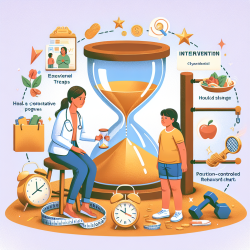Introduction
In the realm of pediatric weight management, timing is everything. Recent research, "Leveraging Seasonality and Timing to Optimize Pediatric Weight Management Interventions: Novel Directions for Future Research," highlights the importance of strategic timing in interventions to improve outcomes for children. This blog delves into the study's findings, providing practitioners with data-driven insights to enhance their therapeutic approaches.
The Importance of Timing
The study underscores the critical role of timing in pediatric weight management. By identifying high-risk periods for weight gain, practitioners can tailor interventions to maximize engagement and effectiveness. Key findings suggest that interventions during school breaks, particularly summer, can mitigate weight gain, which is often more pronounced during these periods.
Data-Driven Insights
According to national estimates, over 35% of American children aged 2–19 are overweight or obese. This statistic highlights the urgent need for effective interventions. The study suggests that timing interventions during specific periods can enhance family engagement and improve outcomes. Here are some data-driven strategies for practitioners:
- Target High-Risk Periods: Focus on times when children are most vulnerable to weight gain, such as summer breaks, to implement brief, intensive interventions.
- Utilize Behavioral Therapy: Incorporate standard behavioral therapy, dietary counseling, and physical activity into interventions, emphasizing consistency and routine.
- Engage Families: Increase family involvement by aligning interventions with family schedules, making it easier for them to participate consistently.
Encouraging Further Research
While the study provides a solid foundation, it also opens avenues for further research. Practitioners are encouraged to explore novel approaches to pediatric weight management, focusing on the timing and duration of interventions. By contributing to this growing body of knowledge, practitioners can help refine strategies that lead to better health outcomes for children.
Conclusion
Timing is a crucial factor in pediatric weight management. By leveraging seasonality and strategic timing, practitioners can enhance the effectiveness of interventions, ultimately creating better health outcomes for children. As we continue to explore these novel directions, the potential for positive change in pediatric health is immense.
To read the original research paper, please follow this link: Leveraging seasonality and timing to optimize pediatric weight management interventions: Novel directions for future research.










